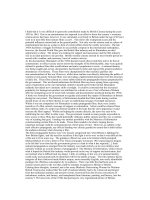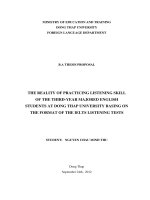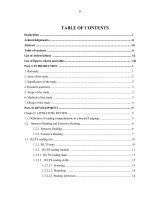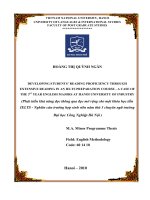Ways of the ielts winners
Bạn đang xem bản rút gọn của tài liệu. Xem và tải ngay bản đầy đủ của tài liệu tại đây (24.08 MB, 147 trang )
J. Abrahim
WAYS OF THE
IELTS WINNERS
Ways of the IELTS
Winners
Sy
By
J. Abrahim
The author is a non-native speaker and has himself scored band 9
in the IELTS.
He is a professional IELTS tutor, and has helped thousands of
students across the world score 7+ in the IELTS.
CONTENT
1. What Does It Take To Be An Ielts Winner?
2. What Is The
2.1
2.2
2.3
2.4
Ielts?
WHAT IS THE IELTS SCORE USED FOR?
STRUCTURE OF THE IELTS
IELTS BANDS
THE MYTHS OF IELTS
3. The Winning Ielts Prep Strategies
3.1 THE FIRST STEP: KNOW YOURSELF
3.2 IDENTIFYING YOUR WEAK AREAS
3.3
3.4
3.5
3.6
WORKING ON YOUR
STRONG AREAS
WHICH IS THE BEST COURSE/BOOK/STUDY MATERIAL FOR ME?
MUST HAVE BOOKS
1S PRIVATE TUTORING THE HOLY GRAIL OF A HIGH SCORE?
4. How Do The Telts Winners Actually
Study:
42 WHAT Is THE RIGHT TIME TO BOOK YOUR IELTS EXAM?
4.3 WHY DO IELTS WINNERS TRAIN LIKE AN ATHLETE?
5. How Did Kiran Go From 5 To 8...
6. Why Some People Score Higher The Second Time Around
7. Beating The Four Components Of The Ielts
7.1 LISTENING
7.2. SPEAKING
7.3 READING
7.4 WRITING
8. The Winning Approach
8.1
8.2
8.3
8.4
8.5
8.6
8.7
TIME MANAGEMENT
DO IELTS WINNERS WORK IN GROUPS?
WHY THE WINNERS IGNORE SELECTED ‘DIFFICULT’ PROBLEMS
WHY YOU SHOULD READ THE NEWSPAPERS
HOW TO FIND OUT YOUR FUTURE IELTS SCORE WITHOUT TAKING THE IELTS
WHEN SHORTCUTS/EDUCATED GUESSES ARE IMPORTANT
WHY MENTAL FITNESS IS KEY
9. How To Get ‘Lucky’ In Ielts
10. The Winning Mind Set
10.1 BURNING | DESIRE TO EXCEL
5 OVERCOME LIMITING BELIERS
12. How Burnouts Can Ruin You Prep & How You Can Avoid
Them
12.41 RECOGNIZING THE SYMPTOMS
12.2 GETTING OUT OF IT
13. How Winners Avoid The ‘Average’ Mindset
14. Telts Winners Countdown To The D Day
14.1 A WEEK BEFORE THE TEST
14.2 THE DAY BEFORE THE TEST
14.3 THE TEST DAY
14.4 THOSE
FIVE HOURS
15.1 WHAT DOES TEST ANXIETY FEEL LIKE?
15.2 WHAT CAN YOU DO TO CONTROL TEST ANXIETY?
15.3 SO HOW DO YOU GET TO BE SELF-CONFIDENT?
1. What does it take to be an IELTS Winner?
If you think it is only knowledge that will make you an IELTS winner, think again. Knowledge can
only take you so far!
There are scores of graduates and even PhDs who have not managed to get a Band 7+ in the IELTS.
Of course, this was before the ‘Ways of the IELTS winners’ existed!
The point is that knowledge by itself is not sufficient to ace the IELTS.
You need the other ‘intangible’ qualities & smart Studying Strategies to make the thing work.
The subsequent sections will discuss some of these strategies, but first...
2. What is the IELTS?
International
English
Language
Testing
System
or commonly
called IELTS
is an exam
that
assesses a person’s English skills. There is no passing or failing score in the IELTS exam. Unlike
other English exams such as TOEFL wherein you need to acquire a certain score to pass the test,
IELTS is more focussed in gauging the individual’s English skills. Each score in the IELTS exam
expresses an individual’s English level.
The IELTS
exam is recognised by most universities around the world
like Australia, UK, New
Zealand, US and Canada. Most of these countries offer studies abroad as well as migration programs
in their country either for permanent residency or work programs making the test an integral part of
their application.
Each
area requires
a certain level of English competency
that will allow
the
examinee to be admitted at the university, gain entrance for permanent residency and get hired for a
job application.
There are two versions of the IELTS Exams and each serves its own purposes. An examinee should
know
which of the two
interchangeable
and
versions
knowing
he must take before applying for the exams.
the specific
type
of IELTS
exam
is necessary
Scores
are not
in completing
your
requirements for your study, immigration or work application.
Academic IELTS is commonly taken by those who are trying to obtain a degree in a university either
for graduate or undergraduate studies. It is used basically in determining the student’s English skills
where English is the main language used during their course study. Meeting the required IELTS score
is essential to gaining acceptance for your studies.
Academic IELTS is an improved English skills test for those who want to gain acceptance for their
studies and are especially planning to study abroad. It consists of the four main areas of English skills
(listening, reading, writing and speaking) wherein reading and writing are entirely different from that
of the General IELTS. These two areas are more comprehensive and needs a thorough analysis by the
examinee.
Academic
TELTS
exam is necessary as well for those who are applying for professional work
abroad like nurses, doctors, dentists and physical therapists.
General IELTS is for individuals who are applying for immigration or working abroad. Employers
and countries where English
is the medium of instruction want to know
the English levels of the
migrants or workers before they accept their application. Obtaining the required score is important in
being accepted for the job as well as in entering the country where you applied for your migration.
General IELTS is a much simpler test compared to the Academic IELTS consisting of the four main
areas of English skills. Its main purpose is generally focussed on the individual’s social survival at
work
and
in the country
s/he
wishes
to live.
This
gauges
the
individual’s
English
skills
in
communicating at his/her work and living environment. Generally, the English skills required when
migrating and applying for work is to have a basic and simple understanding of the English language
allowing the person to express himself. Moreover, General IELTS for work application is for those
applicants that are applying as skilled workers like carpenters, masons, waiters and plumbers.
However,
considering the fact that the IELTS
scores
are not interchangeable,
applying for an
Academic IELTS exam can serve the purpose of all three applications. A minimum score of 5 will be
accepted in getting into a university. Generally your score is dependent on the school’s requirement.
Some schools require a score of 5 while others require a score as high as 7 or 8. For immigration and
job purposes a score of 5 is acceptable.
Where to Apply for an IELTS Exam?
IELTS exam is available worldwide. It has more than 500 locations in 130 different countries. It is
jointly managed by the British Council, IDP - IELTS Australia and the University of Cambridge ESOL
Examinations (Cambridge ESOL).
You can find the nearest IELTS Test Centre in your location by visiting their website (www.ielts.org).
You can either call or send them an email to find more details and information on what you need to do
in applying for your exam.
How to Apply for an IELTS Exam?
IELTS application can be filed in two ways. You can either send your application via mail or you can
apply in person at the IELTS Test Centre.
Filling up the application form properly is very important when applying for your IELTS exam. Make
sure you have filled up all the necessary information and answered all the questions on the form
before registering for your exam.
The following documents
should be completed when filing your IELTS registration via mail or in
person.
Completed IELTS Application Form
Completed IELTS Payment Form
Receipt for your IELTS payment
2 latest passport size photos (not older than 6 months)
Certified photocopy of the first page of your passport where your picture and personal details
are found.
The IELTS Test Centre will send you a confirmation letter via email if your registration for the exam
is sent via mail.
If you
applied
in person your
confirmation
letter will
be
given
to you upon
completion of your application.
How much does an IELTS Exam Cost?
IELTS exam costs the same for both General and Academic exams. Currently it costs £110. There is a
set test fee for the Test Centres in every country.
How long does an IELTS exam take?
Approximately, the IELTS exam takes about 2 hours and 45 minutes. The speaking exam can be taken
on the same day or it can be scheduled for another day within seven days from the date of the exam.
How often is an IELTS exam given?
IELTS exams are usually given three or four times a month depending on the country and the IELTS
Test Centre. Some IELTS exams can be arranged for particular institutions and sponsors as well.
How often can you take the IELTS Exam?
If the desired score is not met, you can take the IELTS exam after three months from the first test date
you had taken the exam on.
How long is the score valid for?
IELTS scores are valid for up to two years. If you are not able to use your test score within the said
validity period, you need to take the exam again if you are applying for your studies, immigration or
work.
What your IELTS Score means?
The IELTS score is an individual’s English level in using the English language. Scores are reported
as band scores from | being the lowest up to 9 being the highest. The examinees are given an overall
band score and separate scores for each of the areas in the Exam.
When is an IELTS exam result issued?
Results of IELTS exams are issued after two weeks from the date you have taken the exam. It is sent to
you personally or it can be sent to five different institutions as specified by you on your application
form.
2.1 What is the IELTS score used for?
Not all scores are created equal
The IELTS score is used for assessing the level of English needed for certain candidates or students
in performing
efficiently
and
effectively
in their
studies,
immigration,
work
or training.
Score
requirements are set by the each of the institutions or organisations and may vary from one to another
depending on their specific needs and requirements.
Enrolling in a College or University
When going for studies abroad especially in Australia, UK, Canada and the US, an IELTS score is
one of the basic requirements. Certain colleges or universities require a minimum Academic IELTS
score of5 or as high as 7 or 8.
IELTS Score for Migration
Most individuals who are migrating to Australia, Canada or New Zealand need to show their English
level before getting their visas at the respective embassy. Individuals are required to have a minimum
General IELTS Score of 5.
IELTS Score for Training and Work
Those who are applying for professional training or work abroad like working as nurses, doctors or
therapists need to have an Academic IELTS score of 7 or 8. This is one of the basic requirements
especially for those who will be working in countries like US, UK, Australia or Canada.
Skilled workers like waiters, carpenters, plumbers and welders who are going to Australia, Canada
or UK need a General IELTS score of 4.5 or 5 before they are accepted for the job they are applying.
Having knowledge why you are being asked for an IELTS score when going for your studies, work or
migration is a way of conditioning your mind for your IELTS preparation. If you want to pursue your
career or migrate in another country you must properly prepare for your IELTS to fulfil your chosen
career path as well as fulfilling your dreams in living abroad.
2.2 Structure of the IELTS
As the saying goes, ‘A familiar devil is better than an unfamiliar one’, it is best to familiarize yourself
thoroughly with the structure of the IELTS before you proceed with the prep.
Listening, Reading, Writing and Speaking are the four components of an IELTS Test.
Listening
The
IELTS
listening test approximately takes
30 minutes.
The
test taker is asked
to listen to a
recorded material only once. There are four sections in the listening test that are presented in an
increasing order of difficulty. The first and second sections are of general topics while the third and
fourth sections are focussed on a certain study or training.
Reading
The IELTS reading test takes 60 minutes. The examinee is provided three reading texts where the
questions are presented in increasing difficulty. There are around 40 questions in the reading exam
that the test taker should answer in an hour.
Writing
The IELTS writing test takes around 60 minutes. There are two sections in the writing test that the
examinee
must complete
in an hour.
The
first task is to complete
a report based
on the given
information. This can be a graph, a diagram or a process. You are asked to describe the information
given and write a report consisting of 150 words in 20 minutes.
The second task is writing an essay on a given topic. The test taker is given 40 minutes to complete
this task and write 250 words. Of the two tasks, the second task carries more weight for getting the
final band score for this component.
Speaking
The speaking test takes about
11 — 14 minutes. It is in the form of an oral interview wherein the
candidate is asked certain questions by the examiner. During the speaking exam, the candidate is
asked questions to answer and express his/her opinions on certain topics and justify them.
The speaking exam is composed of three parts. The first part consists of general questions about the
candidate, his life or his interests. The second part consists of a topic which the test taker has to
discuss or talk about and the third part is a discussion of issues that are linked to the topic of the
second part of the speaking test.
2.3 IELTS Bands
The IELTS is a 9-band test. Each band corresponds to a descriptive statement giving a summary of the
English competence of a candidate classified at that level. Overall Band Scores can be reported in
either whole or half bands.
The nine bands and their descriptive statements are as follows:
9 Expert User
Has fully operational command
of the language:
appropriate,
accurate and fluent with complete
understanding.
8 Very Good User
Has fully operational command of the language with only occasional unsystematic inaccuracies and
inappropriacies.
Misunderstandings
may occur in unfamiliar situations. Handles
complex detailed
argumentation well.
7 Good User
Has operational command of the language, though with occasional inaccuracies, inappropriacies and
misunderstandings
in some situations. Generally handles complex language well and understands
detailed reasoning.
6 Competent User
Has generally effective command
misunderstandings.
Can
use
and
of the language despite some
understand
fairly
complex
inaccuracies,
language,
inappropriacies and
particularly
in
familiar
situations.
5 Modest User
Has partial command of the language, coping with overall meaning in most situations, though is likely
to make many mistakes. Should be able to handle basic communication in own field.
4 Limited User
Basic competence
is limited to familiar situations. Has frequent problems
in understanding and
expression. Is not able to use complex language.
3 Extremely Limited User
Conveys and understands only general meaning in very familiar situations. Frequent breakdowns in
communication occur.
2 Intermittent User
No real communication is possible except for the most basic information using isolated words or
short formulae in familiar situations and to meet immediate needs. Has great difficulty understanding
spoken and written English.
1 Non User
Essentially has no ability to use the language beyond possibly a few isolated words.
0 Did not attempt the test
No assessable information provided.
2.4 The Myths of IELTS
IELTS Myths & Fears
Fear not: here are myth busters to your rescue
Myth: The IELTS Test is more difficult than any other English tests.
Fact: Comparing IELTS Test to TOEFL,
GMAT
or GRE; the IELTS Test is much simpler than the
other three English exams. Each test is focussed in assessing different skills of the candidate. It only
becomes
difficult because of the pressure of meeting a required score to be accepted in a certain
institution for your studies, work or training.
Myth: It is much easier to take the IELTS test in certain countries compared to other countries.
Fact: The IELTS test is standardised globally. The kind of exam given in each country is no different
from the other countries. Candidates who are taking the exam, for example in the Philippines, are
facing the same set of questions as those candidates who are taking the exam in India.
Myth: One gets better scores in certain IELTS Testing Centres.
Fact:
This is more of a local version among those who have not met the required score in IELTS.
This usually surfaces when one fails to achieve the needed score in one testing centre and obtains it
from another testing centre.
Myth: I can choose the type of IELTS test I want to take.
Fact: Not
really.
Everything depends
on the requirement
of the school
applying for. If the school or organisation requires a general or academic
follow this requirement before applying for your exam.
or organisation
you are
score then you have to
Myth: You cannot take the IELTS test more than 3 times.
Fact: This is not true. Anyone can take the IELTS exam as many times as s/he wishes even after
meeting the required IELTS test score for the purpose of improving his/her score.
Myth: IELTS Test is easier in certain parts of the year and difficult in other parts of the year.
Fact:
This
has
been
contested
many
times.
The
formulation
of an IELTS
Test is distributed,
implemented and scheduled randomly and no one knows what exactly they will be given in different
parts of the year.
Myth: Some speaking test examiners are stricter compared to others.
Fact: This is a common misconception among test takers who have been taking the IELTS tests for the
second or third time. Another thing is the discussions among test takers after getting out of their
speaking test feeling very confident about the interview tests and start saying that the examiner is not
strict. The truth is all examiners are trained and are marked for the consistency of their performance.
The way they give their scores on a speaking test is based
in a
criterion that is similar for all
examiners.
Myth: You get better scores in the reading exam if you are familiar with the topic.
Fact: Not true. Familiarity with the topic in the reading exam does not guarantee a candidate that s/he
will be getting better scores. In fact, familiarity with the topic tends to relax the candidates and
answer the questions too quickly. Being familiar with the topic comes as a distraction instead of being
helpful as the questions should be read and answered properly and not in the way you know about the
topic.
Myth: Writing scores are marked depending on the mood of the examiner.
Fact: Everyone has their good and bad days that can affect their work. It is but logical to come to this
conclusion. Examiners are trained with this kind of job and are assessed for their consistency when
marking exams based on the criteria as specified by the management of IELTS.
Myth: You get a lower score when you do not understand parts of the speaking test.
Fact: One thing you should remember when taking the IELTS test is that you are being assessed for
your English communication skills. The thought of asking the examiner to repeat the question does not
mean that you are not good in English. It is actually showing your communicative skills and getting an
assurance that you have understood what was being asked. Asking the examiner to repeat the question
is
actually
demonstrating
your
linguistic
skills
rather
than
answering
the
question
without
understanding what is being asked.
Myth: My score will suffer if my point of view is different from that of the examiner.
Fact: You English skills is not dependent on the examiner’s point of view. You are being assessed on
how you construct and express your ideas on a given topic. Your scores in writing and speaking have
nothing to do with the examiner’s point view. In fact, there is no way for any test taker to know what
the examiner feels about what you have written or spoken about.
Myth: I lose points when the examiner tells me to stop talking during my speaking exam.
Fact: When the examiner asks you to stop talking on the second part of your speaking exams there is
nothing to worry about. It means that the examiner have heard enough to assess your spoken English
ability.
Myth: One can study successfully for the test on his/her own.
Fact: This actually depends on your level of understanding and how well you comprehend everything
about the four components of the exam. One might have a misconception and think that getting into a
review program for IELTS or for any exam for that matter, is all for profiteering. A guided review is
better than reviewing on your own. You get to discuss with your fellow reviewers when you are
enrolled in an IELTS preparation class. This allows you to speak the English language, express your
ideas in English and get to learn more on how to develop the right way of taking your written exams
and get them evaluated. There is no one to criticize your work when you are reviewing on your own
and the room for improving yourself is too small.
Myth: Taking as many practice tests will give you better scores in IELTS.
Fact: It helps but the real essence of taking the practice tests is to know where you have committed
the mistakes and how you can improve them and start formulating your own strategies whenever a
certain type of question is presented to you. Taking the practice tests and checking your work is fine
but without analysing the mistakes you have made there is no way you can improve your ability and
increase your score.
Myth: Listening test is the most difficult part of the exam.
Fact: There is nothing easy or difficult in any of the four components of the IELTS exam. Everything
is dependent on how the student feels after taking the exam. There will be parts where certain
difficulties are met and the candidate might end up saying this part is more difficult than others.
Myth: Getting a good score in IELTS is a proof that I can always use it in the future.
Fact: You cannot use your IELTS test scores all the time. An IELTS score is valid only for two years
and it will be accepted within that period alone.
3. The Winning IELTS Prep Strategies
Given the staggering diversity in the applicant pool, there can be no ONE
winning strategy
for
IELTS.
However, having been a high scorer myself and having interacted with hundreds of high scorers from
around the world, there is a clear-cut list of study materials that a majority of winners have used.
This is not to say that this is the ‘Exclusive’ list, but doing more from this list will open the door for
you to reach your full potential.
3.1 The First Step: Know yourself
Typically, the first step that IELTS winners take is to identify their own strengths and weaknesses. It
needs a bit of analysis and a bit of taking some comprehensive tests under IELTS conditions.
Before you proceed with the actual preparation, you need to know where exactly you stand and how
much ground you need to cover.
It helps to assess your strengths and weaknesses through a good quality test; one that is comparable to
the actual IELTS test in both the quality of its questions and its scoring.
Here, it is very important that you do not attach too much significance to your score on this test — the
test has to be purely of an indicative nature. You should neither get disheartened with a low score nor
get complacent with a high score, for it can all change — for better or for worse — by the time you take
the actual test.
Given the diversity of IELTS winners, and their educational background, some are bound to be strong
in one or more areas of Reading while others could have their strengths in the Writing section.
You need to take a closer look at the IELTS syllabus and take two full-length practice papers. This
will give you.a good idea of where you stand and which IELTS areas you need to focus on.
The best source for these tests would be either IELTS Practice Tests by Peter May or Cambridge
Practice Test for IELTS 7 by Vanessa Jakeman.









